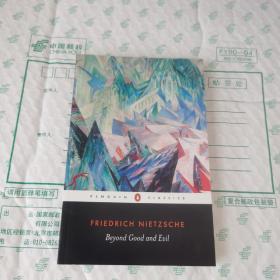
Beyond Good and Evil(现货,实拍书影)
Oxford World's Classics
¥ 86 九五品
仅1件
作者Friedrich Nietzsche, Marion Faber、 Robert C. Holub
出版社OUP Oxford
ISBN9780199537075
出版时间1978
印刷时间2008
装帧平装
尺寸19.6 × 12.7 cm
页数240页
货号V2
上书时间2019-04-16
- 在售商品 暂无
- 平均发货时间 13小时
- 好评率 暂无
- 最新上架
商品详情
- 品相描述:九五品
- 外表及边缘轻微磕碰磨损,新书未曾使用(见实拍书影)。
- 商品描述
-
Always provocative, the Friedrich Nietzsche of Beyond Good and Evil (1886) is at once sceptical psychologist and philosopher seer, passionately unmasking European society with his piercing insights and uncanny prescience. This masterpiece of his maturity considers quintessential Nietzschean topics such as the origins and nature of Judeo Christian morality; the end of philosophical dogmatism and beginning of perspectivism; the questionable virtues of science and scholarship; liberal democracy, nationalism, and women's emancipation. Written in his most masterful style, full of irreverence and brio, Nietzsche dissects self-deluding human behaviour, bankrupt intellectual traditions, and the symptoms of social decadence, while at the same time advancing an extra moral wisdom to be shared by those kindred soul who think 'beyond good and evil'.
This new translation of Beyond Good and Evil provides readers with a true classic of modernity that sums up those forces and counterforces in nineteenth century Western Civilisation that to an astonishing degree have also determined and continue to inform the course of our own century.
Friedrich Nietzsche was born near Leipzig in 1844, the son of a Lutheran clergyman. At 24 he was appointed to the chair of classical philology at Basle University, where he stayed until forced by his health to retire in 1879. Here, he wrote all his literature, including Thus Spake Zarathustra, and developed his idea of the Superman. He became insane in 1889 and remained so until his death in 1900.
Translated and edited by Marion Faber, Professor of German at Swathmore College, Pennsylvania.
Introduction by Robert C. Holub is Professor and Chair of the Department of German, University of California at Berkeley.
相关推荐
-

NIETZSCHE BEYOND GOOD AND EVIL
八五品欧洲
¥ 380.00
-

Beyond Good and Evil (Penguin Classics)
八五品南宁
¥ 50.00
-

Beyond Good and Evil (Penguin Classics)
九品北京
¥ 68.00
-

Beyond Good and Evil (Penguin Classics)
九品北京
¥ 75.00
-

Beyond Good and Evil (Penguin Classics)
八五品武汉
¥ 42.00
-

Beyond Good and Evil (Penguin Classics)
八五品成都
¥ 72.00
-

Beyond Good and Evil (Penguin Classics)
九品廊坊
¥ 35.00
-

Beyond Good and Evil / Friedrich Nietzsche
七五品北京
¥ 69.00
-

Beyond Good and Evil (Penguin Classics)
九品上海
¥ 35.00
-

Beyond Good and Evil (Penguin Classics)
九五品烟台
¥ 71.80
— 没有更多了 —






















以下为对购买帮助不大的评价